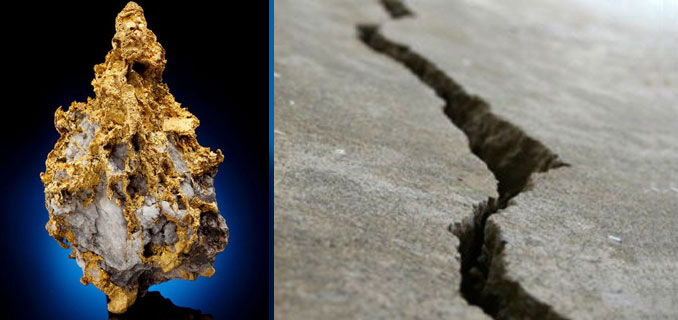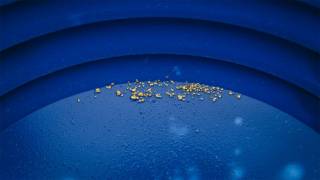Earthquakes turn water into gold
Source: cbc.ca

Research reveals high-pressure origin of precious metal
Gold could be deposited almost instantaneously in the Earth’s crust during earthquakes, say Australian researchers.
The researchers have found gold is formed when an earthquake widens a fluid-filled rock fracture, causing a drop in pressure, which in turn allows gold dissolved in the fluid to rapidly leach out.
Their study, reported in the journal Nature Geoscience, explains how the metal changes from a soluble state to concentrated deposits.
"[This process] may underpin the formation of up to 80 per cent of the world’s gold deposits," they write.
Much of the world’s gold is found in quartz veins that formed during periods of mountain building up to three billion years ago and was deposited by large volumes of water along deep, seismically active faults.
The veins were formed under fluctuating pressures during earthquakes, but until now, the magnitude of these pressure shifts and how they influence the formation of gold was unknown.
Dr. Dion Weatherley of the University of Queensland and Professor Richard Henley from the Australian National University, developed a mathematical model to see how different earthquake magnitudes affect fluid-filled rock fractures.
They found that a sudden drop in pressure in the fracture causes the fluid inside to expand and vaporise — a process known as flash vaporization.
"The change in the volume of the fracture causes a change in fluid pressure," explains Weatherley.
"The fluid becomes supersaturated at the low pressures and the various minerals that are dissolved will precipitate out very rapidly."
Gold deposits build up
Different minerals are known to precipitate out of fluids at specific pressures.
Weatherley and Henley found the ability of minerals to dissolve out of the water grew quickly even for relatively small earthquakes.
While a single event may not deposit significant levels of gold, successive earthquakes in the same area can cause a build up of these deposits within the fracture eventually leading to economically viable gold concentrations, say the researchers.
The bulk of gold mined today has been found where deposits are exposed on or near the surface.
According to Weatherley, geologists believe they’ve explored the majority of the dry part of the planet, and now have to start looking for deposits which are hidden in deeper parts of the crust.
That requires more knowledge on the geological processes that have been occurring in that part of the world.
"When we know what forms a deposit, we can go looking for ancillary tell-tale signs of where those kind of mechanisms may have been occurring both in the recent past and through geological time," says Weatherley.
"This may assist in future gold exploration efforts."
Article from: cbc.ca






















